Prologue
Scene 1
A crowd throngs by the high walls of the Novodevichy Monastery in Moscow. The boyar, Boris Godunov, haswithdrawn to the monastery after the death of Tsar Fyodor, who did not leave an heir. That Boris will be elected to the throne is a foregone conclusion, but he makes a show of refusing the crown sothat he is not suspected of wishing to seize power. At the order of a police officer, the people beg Godunov to accept election to the throne:
“Do not abandon us, Father,
Do not leave us helpness!”
But Shchelkalov, secretary of the Duma, announces that Boris is implacable.
Scene 2
Square in front of the Cathedral of the Assumption in the Kremlin. A majestic pealing of bells — Boris has given his consent and is being crowned. But Tsar Boris is not happy, he is weighed down byanxiety:
“My soul is heavy,
Some instinctive fear
With ominous foreboding
Rivets my heart...”
In the Kremlin the bells are pealing and the people break out again into acclamation.
Act I
Scene 1
Late at night. A cell in the Chudov Monastery. By the light of an icon-lamp, the wise monk Pimen is writing a truthful chronicle of the history of the Russian state. In his chronicle, Pimen revealsthe secret of the murder, by Boris Godunov, of Tsarevitch Dimitri who had stood between him and the throne. Grigory, a young novice, sharing Pimen’s cell, wakes up. He listens to the holy man’s taleand a storm of anxieties, passions and vainglorious ambitions breaks into the peace of the night. The idea comes to Grigory of calling himself the Tsarevitch and of doing battle with Boris for thethrone.
“Boris! Boris! All tremble before you,
No one dares to remind you
Of the fate of the hapless infant...
But meanwhile a hermit in a dark cell
Is writing a terrible denunciation against you.
And you shall not escape human judgment,
As you shall not escape the judgment of heaven!”
Scene 2
An inn near the Lithuanian frontier. Three vagabond monks, Varlaam, Missail and Grigory, have dropped in on the sprightly, merry mistress of the establishment. Varlaam, a drunkard and glutton, singsa song about the capture of Kazan. Grigory, questions the mistress of the inn on the best route to Lithuania. A police officer comes into the inn: on the Tsar’s orders he is searching for therunaway monk, Grigory Otrepiev. After an unsuccessful attempt to deflect the suspicion from himself, Grigory leaps through the window and makes good his escape.
Act II
Scene 3
The Tsar’s private apartment in the Kremlin. Tsarevitch Fyodor is looking at the “Book of the Big Drawing”, the first map of Russia. Ksenia, Boris’ daughter, is grieving before a portrait of her deadfiancй, the heir to the Danish throne. In an attempt to cheer her up, her old nurse tells her a funny story. Boris comes in and talks tenderly to his children, he is pleased to see his son gleaningwisdom from a book. But even here, with his children, Boris is tormented by anguish. Russia has been visited by a terrible famine. “People affected with the plague wander about like wild animals”,and the common people blame the Tsar for all their troubles: “in the squares they curse the name of Boris”. Something approaching a groan breaks out from deep down inside the Tsar:
“All around is darkness and impenetrable gloom,
O, for a fleeting glimpse of a ray of joy!..
Some secret anxiety,
One inconstantly expecting disaster!..”
The boyar, Shuisky, comes in, a cunning courtier and leader of a group of boyars with seditious intentions. He brings bad news: a pretender has raised his head in Lithuania, having taken the name ofthe Tsarevitch Dimitri. He has the support of the King of Poland, the Polish nobles and the Pope. Boris requires Shuisky to tell him the truth: is he certain that the babe who was killed in the townof Uglich was the Tsarevitch Dimitri? Shuisky, enjoying the Tsar’s torment, describes the deep wound on the Tsarevitch’s neck, and the angelic smile on his lips...
“It seemed, that in his cradle
He was peacefully sleeping...”
Shuisky departs, having aroused with new force the fears and agitation which grip Boris: the latter now thinks he sees an apparition of the murdered Dimitri.
Act III
Scene 4
A ball in the garden of Mnishek, the Governor of Sandomir. The Polish nobles are preparing to march on Moscow. They mean to place their protйgй on the Russian throne:Grigory, the runaway monk from the Chudov monastery, who has taken the name of the murdered Tsarevitch Dimitri. In this they will be helped by the ambitious plans of the Governor’s daughter, thebeautiful Marina, who dreams of becoming the wife of the future king of Russia. The long-awaited (by the Pretender) rendezvous between Marina and Dimitri who is in love with her takes place.However, Marina’s abrupt and calculating speech, and her determination, which she makes no attempt to conceal, to sit on the Russian throne disconcert the Pretender for a brief moment. Realizingthis, Marina wins him over by false protestations of her love for him. The Jesuit, Rangoni, celebrates his victory.
Scene 5
An early winter’s morning. A square in front of the Cathedral of St. Basil the Blessed in Moscow. A crowd of starving people are discussing the Pretender’s victories over the forces of Boris. ASimpleton comes running into the Square. Urchins surround him and take a kopek from him . The Tsar comes out of the Cathedral. “Bread, bread! Give the starving bread! Give us bread, father, for thesake of Christ!” cries the crowd. Goaded by the urchins, the Simpleton addresses the Tsar: “Order them to be killed, as you killed the little Tsarevitch”. Boris tells the boyars not to seize theSimpleton:
“Let him be! Pray for me, simple person...”
But the Simpleton replies:
“No, Boris! It can not be done!
How can one pray for a Tsar Herod?
Our Lady does not allow it...”
Act IV
Scene 6
A clearing in the forest near Kromy. Night-time. The peasants, who are in revolt, lead in a Kromy boyar whom they have taken prisoner. Theymake fun of the boyar, reminding him of all their grudges:
“You trained us the right way,
In storms and bad weather, and when roads were impassable,
You exploited us,
And whipped us with a slender lash...”
The arrival of the monks, Varlaam and Missail, who denounce the sins of Boris, the regicide, stirs up the crowd’s anger even more. They break out into a threatening song:
“A dashing young force is on the rampage,
The Cossack blood is all aflame!
A great subversive power has risen from the depths...”
Jesuit priests, the Pretender’s emissaries, appear. But the arrival of these foreigners arouses the crowd’s indignation. The peasants drag the Jesuits into the forest to be hanged.
The Pretender, rides into the clearing, surrounded by troops, Polish gentry and Jesuits. He frees the Kromy boyar. By promising his favor and protection, the Pretender persuades the peasants tomarch on Moscow. The sky lights up with the glow of a fire. The alarm bell is rung. The Simpleton appears, looking round him in fear. His prophetic words of the new troubles that await the Russianpeople are spoken in anguish and pain:
“Flow, flow, bitter tears,
Cry, cry, Russian Orthodox soul!
Soon the enemy will come and darkness will fall,
Black, impenetrable darkness...”
Scene 7
The Granovitaya Chamber, in the Kremlin. A session of the Duma is in progress. The boyars are discussing what punishment should be meted out to thePretender should he be caught. Shuisky appears. He describes the scene in the Tsar’s private apartment, when Boris drove off the apparition of the murdered Tsarevitch Dimitri. At this point, Boriscomes running in, shouting: “Away, away, child!” Catching sight of the boyars, he regains his self-control and asks them for advice and help. At this, Shuisky suggests to the Tsar that he listen to aholy man who has come to tell them of a great secret. Boris agrees. Pimen is brought in. Pimen’s tale of the miraculous cure of a sick man at the grave of the murdered Tsarevitch Dimitri, inUglich, is more than Boris can take and he falls senseless to the floor. Regaining consciousness, the dying Tsar gives his son advice on how to protect his kingdom:
“Don not trust the slander of the seditious boyars,
Keep a vigilant watch over their secret dealings with Lithuania,
Punish treason without mercy, without charity punish it,
Listen carefully to what the people say -
for their judgement is not hypocritical...”
To the pealing of the funeral bell and the chanting of a choir of monks, the Tsar dies. The shocked Tsarevitch Fyodor, having paid his last respects to his father, rises to his feet...Andimmediately, Shuisky who, unseen, had crept ahead of him, blocks his way to the throne.
Time: The years 1598 to 1605
Place: Moscow; the Lithuanian frontier; a castle in Sandomierz; Kromï
Part 1 / Prologue
Scene 1: The Courtyard of the Novodevichiy Monastery near Moscow (1598)
There is a brief introduction foreshadowing the 'Dmitriy Motif'. The curtain opens on a crowd in the courtyard of the monastery, where the weary regent Boris Godunov has temporarily retired. Nikitich the police officer orders the assembled people to kneel. He goads them to clamor for Boris to accept the throne. They sing a chorus of supplication ("To whom dost thou abandon us, our father?"). The people are bewildered about their purpose and soon fall to bickering with each other, resuming their entreaties only when the policeman threatens them with his club. Their chorus reaches a feverish climax. Andrey Shchelkalov, the Secretary of the Duma, appears from inside the convent, informs the people that Boris still refuses the throne of Russia ("Orthodox folk! The boyar is implacable!"), and requests that they pray that he will relent. An approaching procession of pilgrims sings a hymn ("Glory to Thee, Creator on high"), exhorting the people to crush the spirit of anarchy in the land, take up holy icons, and go to meet the Tsar. They disappear into the monastery.
[Original 1869 Version only: The people discuss the statements of the pilgrims. Many remain bewildered about the identity of this Tsar. The police officer interrupts their discussion, ordering them to appear the next day at the Moscow Kremlin. The people move on, stoically exclaiming "if we are to wail, we might as well wail at the Kremlin".]
Scene 2: [Cathedral] Square in the Moscow Kremlin (1598).
The orchestral introduction is based on bell motifs. From the porch of the Cathedral of the Dormition, Prince Shuysky exhorts the people to glorify Tsar Boris. As the people sing a great chorus of praise ("Like the beautiful sun in the sky, glory"), a solemn procession of boyars exits the cathedral. The people kneel. Boris appears on the porch of the cathedral. The shouts of "Glory!" reach a climax and subside. Boris delivers a brief monologue ("My soul grieves") betraying a feeling of ominous foreboding. He prays for God's blessing, and hopes to be a good and just ruler. He invites the people to a great feast, and then proceeds to the Cathedral of the Archangel to kneel at the tombs of Russia's past rulers. The people wish Boris a long life ("Glory! Glory! Glory!"). A crowd breaks toward the cathedral. The police officers struggle to maintain order. The people resume their shouts of "Glory!"
In this scene, Mussorgsky is hailed to be ahead of his time musically. His use of the whole tone scale, which uses only whole steps, made the Coronation scene stand out. This technique was replicated by impressionistic composers about 20 years later who noted his success. Mussorgsky also combined different two-beat and three-beat meters to create a unique sound for his composition called polymeters. These techniques were uncommon during this era and were believed to be almost too overwhelming for the public. This led to his rejection on two different occasions by the Imperial Opera before they decided to perform.
Part 2 / Act 1
Scene 1: Night. A Cell in the Chudov Monastery [within the Moscow Kremlin] (1603)
Pimen, a venerable monk, writes a chronicle ("Yet one last tale") of Russian history. The young novice Grigoriy awakes from a horrible (and prophetic) dream, which he relates to Pimen, in which he climbed a high tower, was mocked by the people of Moscow, and fell. Pimen advises him to fast and pray. Grigoriy regrets that he retired so soon from worldly affairs to become a monk. He envies Pimen's early life of adventure. Pimen speaks approvingly of Ivan the Terrible and his son Fyodor, who both exhibited great spiritual devotion, and draws a contrast with Boris, a regicide.
[Original 1869 Version only: At Grigoriy's request, Pimen tells the vivid details of the scene of the murder of Dmitriy Ivanovich, which he witnessed in Uglich.]
Upon discovering the similarity in age between himself and the murdered Tsarevich, Grigoriy conceives the idea of posing as the Pretender. As Pimen departs for Matins, Grigoriy declares that Boris shall escape neither the judgment of the people, nor that of God.
Scene 2: An Inn on the Lithuanian Border (1603)
There is a brief orchestral introduction based on three prominent themes from this scene.
[Revised 1872 Version only: The Hostess enters and sings the 'Song of the Drake' ("I have caught a gray drake"). It is interrupted towards the end by approaching voices].
The vagrants Varlaam and Misail, who are dressed as monks and are begging for alms, and their companion Grigoriy, who is in secular garb, arrive and enter. After exchanging greetings, Varlaam requests some wine. When the Hostess returns with a bottle, he drinks and launches into a ferocious song ("So it was in the city of Kazan") of Ivan the Terrible's siege of Kazan. The two monks quickly become tipsy, and soon begin to doze. Grigoriy quietly asks the Hostess for directions to the Lithuanian border. The Hostess mentions that the police are watching the ordinary roads, but they are wasting their time, because there is an alternative, less well-known way to get to the border. Policemen appear in search of a fugitive heretic monk (Grigoriy) who has run off from the Chudov Monastery declaring that he will become Tsar in Moscow. Noticing Varlaam's suspicious appearance and behavior, the lead policeman thinks he has found his man. He cannot read the ukaz (edict) he is carrying, however, so Grigoriy volunteers to read it. He does so, but, eyeing Varlaam carefully, he substitutes Varlaam's description for his own. The policemen quickly seize Varlaam, who protests his innocence and asks to read the ukaz. Varlaam is only barely literate, but he manages to haltingly read the description of the suspect, which of course matches Grigoriy. Grigoriy brandishes a dagger, and leaps out of the window. The men set off in pursuit.
Part 3 / Act 2
The Interior of the Tsar's Terem in the Moscow Kremlin (1605)
Kseniya (or Xenia), clutching a portrait of "Prince Ivan", her betrothed who has died, sings a brief mournful aria ("Where are you, my bridegroom?"). Fyodor studies a great map of the Tsardom of Russia.
[Revised 1872 Version only: Fyodor tries to console Kseniya and shows her the magic of the clock, once it starts chiming].
Kseniya's nurse assures her that she will soon forget about "Prince Ivan".
[1872: The nurse and Fyodor attempt to cheer Kseniya up with some songs ("A gnat was chopping wood" and "A little tale of this and that").]
Boris abruptly enters, briefly consoles Kseniya, and then sends her and her nurse to their own quarters. Fyodor shows Boris the map of Russia. After encouraging his son to resume his studies, Boris delivers a long and fine soliloquy ("I have attained supreme power").
[1872: At the end of this arioso he reveals that he has been disturbed by a vision of a bloody child begging for mercy. A commotion breaks out in his children's quarters. Boris sends Fyodor to investigate.]
The boyar-in-attendance brings word of the arrival of Prince Shuysky, and reports a denunciation against him for his intrigues.
[1872: Fyodor returns to relate a whimsical tale ("Our little parrot was sitting") involving a pet parrot. Boris takes comfort in his son's imagination and advises Fyodor, when he becomes Tsar, to beware of evil and cunning advisors such as Shuysky.]
Prince Shuysky now enters. Boris insults him, accusing him of conspiring with Pushkin, an ancestor of the poet. However, the prince brings grave tidings. A Pretender has appeared in Lithuania. Boris angrily demands to know his identity. Shuysky fears the Pretender might attract a following bearing the name of Tsarevich Dmitriy. Shaken by this revelation, Boris dismisses Fyodor. He orders Shuysky to seal the border with Lithuania, and, clearly on the edge of madness, asks Shuysky whether he has ever heard of dead children rising from their graves to question Tsars. Boris seeks assurance that the dead child the prince had seen in Uglich was really Dmitriy. He threatens Shuysky, if he dissembles, with a gruesome execution. The Prince describes the ghastly scene of Dmitriy's murder in a brief and beautiful aria ("In Uglich, in the cathedral"). But he gives hints that a miracle (incorruptibility) has occurred. Boris begins choking with guilt and remorse, and gives a sign for Shuysky to depart.
[1872: The chiming clock again begins working.]
Boris hallucinates (Hallucination or 'Clock' Scene). The spectre of the dead Dmitriy reaches out to him. Addressing the apparition, he denies his responsibility for the crime: "Begone, begone child! I am not thy murderer... the will of the people!" He collapses, praying that God will have mercy on his guilty soul.
Act 3 (The 'Polish' Act) (1872 Version only)
Scene 1: The Boudoir of Marina Mniszech in Sandomierz [Poland] (1604)
Maidens sing a delicate, sentimental song ("On the blue Vistula") to entertain Marina as her chambermaid dresses her hair. Marina declares her preference for heroic songs of chivalry. She dismisses everyone. Alone, she sings of her boredom ("How tediously and sluggishly"), of Dmitriy, and of her thirst for adventure, power, and glory. The Jesuit Rangoni enters, bemoans the wretched state of the church, attempts to obtain Marina's promise that when she becomes Tsaritsa she will convert the heretics of Moscow (Russian Orthodox Church) to the true faith (Roman Catholicism), and encourages her to bewitch the Pretender. When Marina wonders why she should do this, Rangoni angrily insists that she stop short of nothing, including sacrificing her honor, to obey the dictates of the church. Marina expresses contempt of his hypocritical insinuations and demands he leave. As Rangoni ominously tells her she is in the thrall of infernal forces, Marina collapses in dread. Rangoni demands her obedience.
Scene 2: Mniszech's Castle in Sandomierz. A Garden. A Fountain. A Moonlit Night (1604)
Woodwind and harp accompany a pensive version of the 'Dmitriy Motif'. The Pretender dreams of an assignation with Marina in the garden of her father's castle. However, to his annoyance, Rangoni finds him. He brings news that Marina longs for him and wishes to speak with him. The Pretender resolves to throw himself at Marina's feet, begging her to be his wife and Tsaritsa. He entreats Rangoni to lead him to Marina. Rangoni, however, first begs the Pretender to consider him a father, allowing him to follow his every step and thought. Despite his mistrust of Rangoni, the Pretender agrees not to part from him if he will only let him see Marina. Rangoni convinces the Pretender to hide as the Polish nobles emerge from the castle dancing a polonaise (Polonaise). Marina flirts, dancing with an older man. The Poles sing of taking the Muscovite throne, defeating the army of Boris, and capturing him. They return to the castle. The Pretender comes out of hiding, cursing Rangoni. He resolves to abandon wooing Marina and begin his march on Moscow. But then Marina appears and calls to him. He is lovesick. She, however, only wants to know when he will be Tsar, and declares she can only be seduced by a throne and a crown. The Pretender kneels at her feet. She rejects his advances, and, attempting to spur him to action, dismisses him, calling him a lackey. Having reached his limit, he tells her he will depart the next day to lead his army to Moscow and to his father's throne. Furthermore, as Tsar he will take pleasure in watching her come crawling back looking for her own lost throne, and will command everyone to laugh at her. She quickly reverses course, tells him she adores him, and they sing a duet ("O Tsarevich, I implore you"). Rangoni observes the amorous couple from afar, and, joining them in a brief trio, cynically rejoices in his victory.
Part 4 / Act 4
Scene 1 [1869 Version only]: The Square before the Cathedral of Vasiliy the Blessed in Moscow (1605)
A crowd mills about before the Cathedral of the Intercession (the Temple of Vasiliy the Blessed) in Red Square. Many are beggars, and policemen occasionally appear. A group of men enters, discussing the anathema the deacon had declared on Grishka (Grigoriy) Otrepyev in the mass. They identify Grishka as the Tsarevich. With growing excitement they sing of the advance of his forces to Kromï, of his intent to retake his father's throne, and of the defeat he will deal to the Godunovs. A yuródivïy enters, pursued by urchins. He sings a nonsensical song ("The moon is flying, the kitten is crying"). The urchins greet him and rap on his metal hat. The yuródivïy has a kopek, which the urchins promptly steal. He whines pathetically. Boris and his retinue exit the Cathedral. The boyars distribute alms. In a powerful chorus ("Benefactor father... Give us bread!"), the hungry people beg for bread. As the chorus subsides, the yuródivïy's cries are heard. Boris asks why he cries. The yuródivïy reports the theft of his kopek and asks Boris to order the boys' slaughter, just as he did in the case of the Tsarevich. Shuysky wants the yuródivïy seized, but Boris instead asks for the holy man's prayers. As Boris exits, the yuródivïy declares that the Mother of God will not allow him to pray for Tsar Herod (see Massacre of the Innocents). The yuródivïy then sings his lament ("Flow, flow, bitter tears!") about the fate of Russia.
Scene 2 [1869 Version] / Scene 1 [1872 version]: The Faceted Palace in the Moscow Kremlin (1605)
A session of the Duma is in progress.
[Original 1869 Version only: The assembled boyars listen as Shchelkalov, reading the Tsar's ukaz (edict), informs them of the Pretender's claim to the throne of Russia, and requests they pass judgment on him.]
After some arguments, the boyars agree ("Well, let's put it to a vote, boyars"), in a powerful chorus, that the Pretender and his sympathizers should be executed. Shuysky, whom they distrust, arrives with an interesting story. Upon leaving the Tsar's presence, he observed Boris attempting to drive away the ghost of the dead Tsarevich, exclaiming: "Begone, begone child!" The boyars accuse Shuysky of spreading lies. However, a dishevelled Boris now enters, echoing Shuysky: "Begone child!" The boyars are horrified. After Boris comes to his senses, Shuysky informs him that a humble old man craves an audience. Pimen enters and tells the story ("One day, at the evening hour") of a blind man who heard the voice of the Tsarevich in a dream. Dmitry instructed him to go to Uglich and pray at his grave, for he has become a miracle worker in heaven. The man did as instructed and regained his sight. This story is the final blow for Boris. He calls for his son, declares he is dying ("Farewell, my son, I am dying"), gives Fyodor final counsel, and prays for God's blessing on his children. In a very dramatic scene ("The bell! The funeral bell!"), he dies.
Scene 2 [1872 Version only]: A Forest Glade near Kromï (1605)
Tempestuous music accompanies the entry of a crowd of vagabonds who have captured the boyar Khrushchov. The crowd taunts him, then bows in mock homage ("Not a falcon flying in the heavens"). The yuródivïy enters, pursued by urchins. He sings a nonsensical song ("The moon is flying, the kitten is crying"). The urchins greet him and rap on his metal hat. The yuródivïy has a kopek, which the urchins promptly steal. He whines pathetically. Varlaam and Misail are heard in the distance singing of the crimes of Boris and his henchmen ("The sun and moon have gone dark"). They enter. The crowd gets worked up to a frenzy ("Our bold daring has broken free, gone on a rampage") denouncing Boris. Two Jesuits are heard in the distance chanting in Latin ("Domine, Domine, salvum fac"), praying that God will save Dmitriy. They enter. At the instigation of Varlaam and Misail, the vagabonds prepare to hang the Jesuits, who appeal to the Holy Virgin for aid. Processional music heralds the arrival of Dmitriy and his forces. Varlaam and Misail glorify him ("Glory to thee, Tsarevich!") along with the crowd. The Pretender calls those persecuted by Godunov to his side. He frees Khrushchov, and calls on all to march on Moscow. All exeunt except the yuródivïy, who sings a plaintive song ("Flow, flow, bitter tears!") of the arrival of the enemy and of woe to Russia.


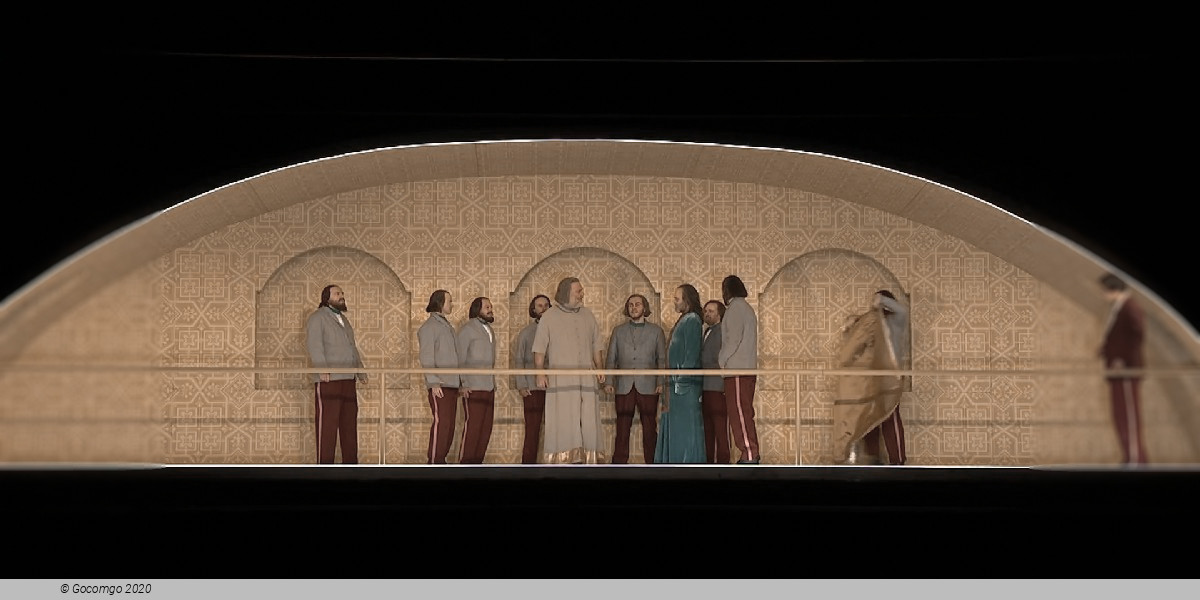
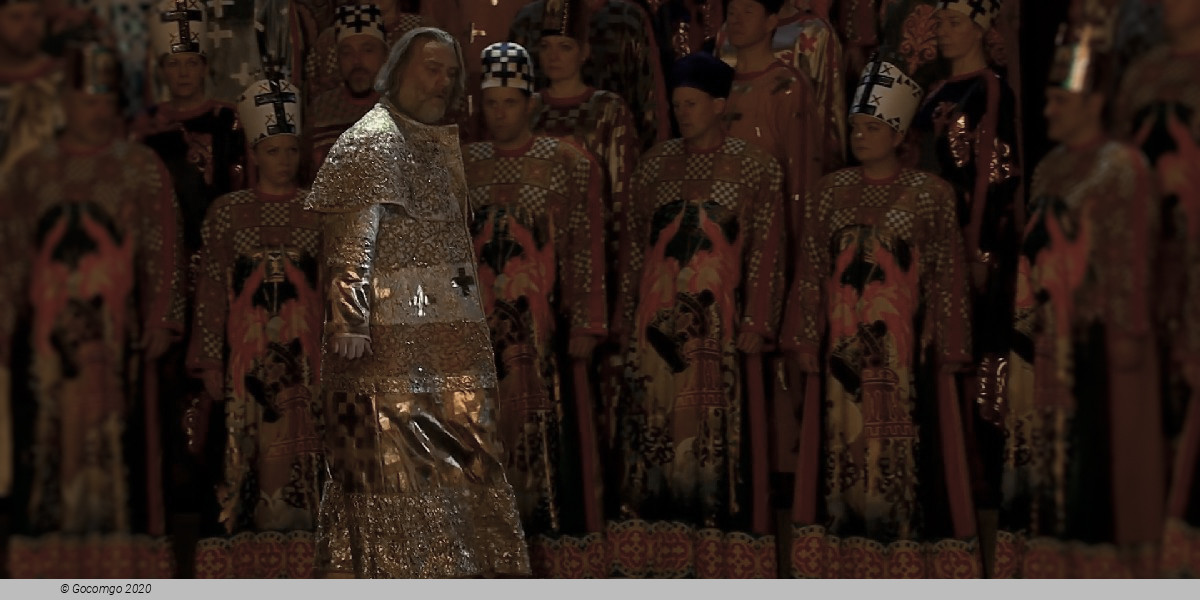
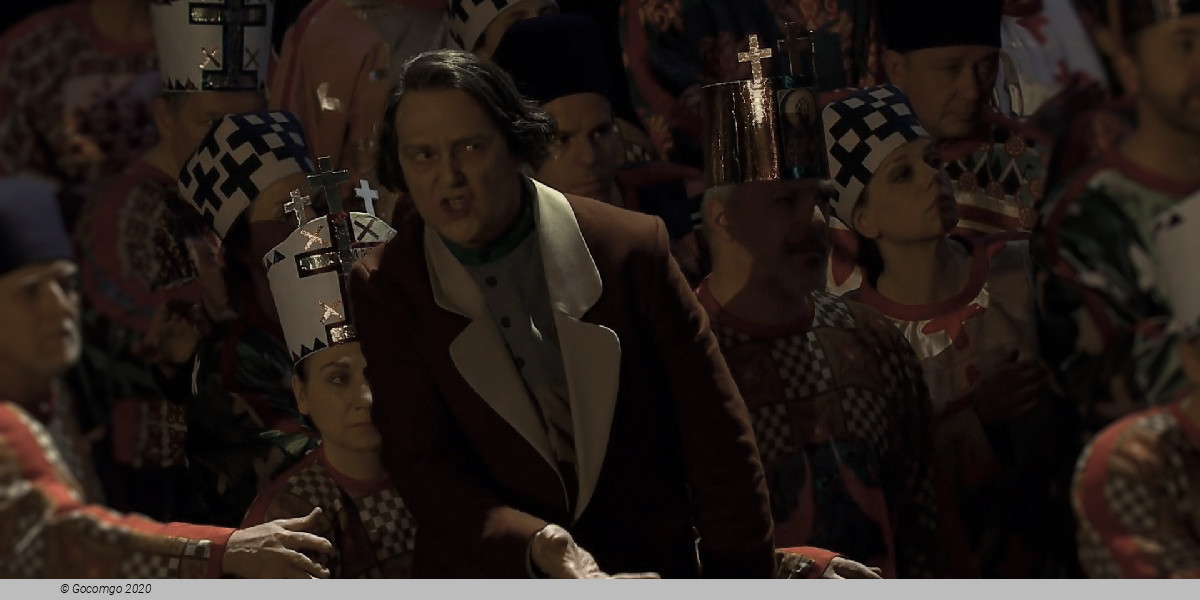
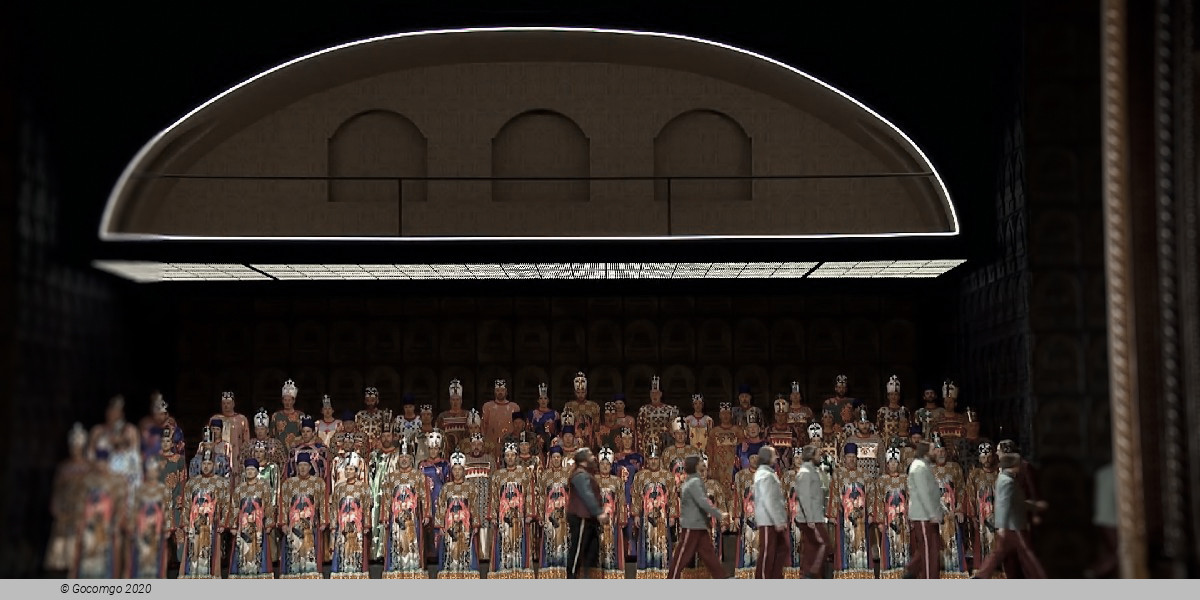
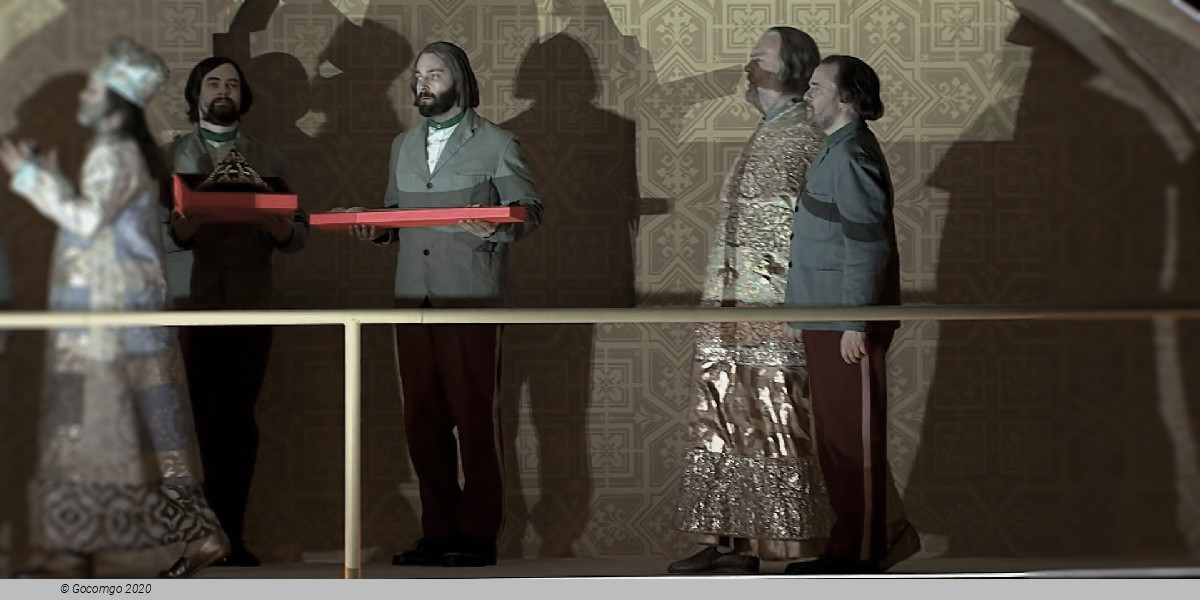
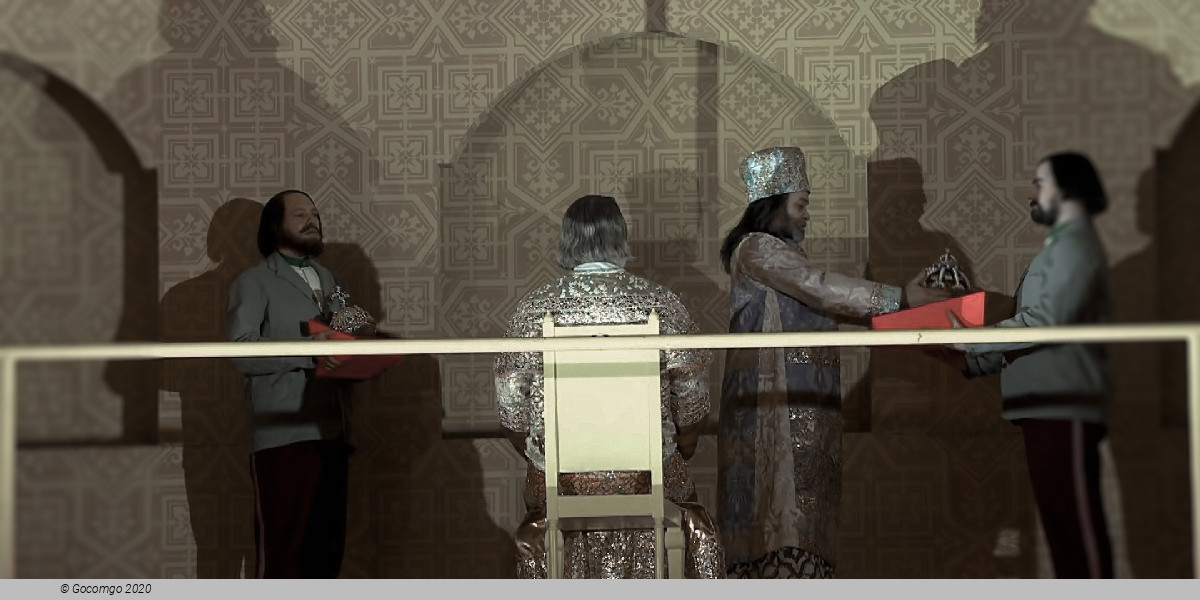
 Teatralnaya Square 1
Teatralnaya Square 1